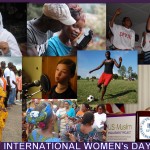The Common Ground Blog is an initiative of (Search for Common Ground), an international non-governmental organization (NGO), headquartered in Washington and Brussels, whose mission is to transform the way the world deals with conflict - away from adversarial confrontation towards cooperative solutions. (more info)
A Unique Opportunity for Zanzibar
By Elisabeth Biber
Despite the recent joyful celebrations for Eid al-Fitr – the end of Ramadan, the Islamic holy month of fasting – the paradise archipelago of Zanzibar, with its “hamna shida” (“no worries”) mentality, seems to be preoccupied with bigger things. Boys in the street are playing as usual with their new Eid gifts, mostly plastic guns; yet, they are not just playing any game, they are running around the streets as ‘anti-riot police’ shooting at ‘demonstrators’ – simulating the re-occurring anti-union riots in Stone Town. Their playful calls for a “Sovereign Zanzibar” and an “End to the Union” are not the only signs for underlying tensions simmering on the Island.
A sticker plastered on many of the walls around Stone Town features the message: “Be proud, Be Zanzibari” along with images of red lychees. Indeed, the lychee season has just started and, while Zanzibar can be proud of their amazingly sweet taste, these stickers carry a slightly different meaning. On my way to work I often try to translate the newest slogans (which magically appear on the walls overnight) calling for a sovereign Zanzibar in beautiful metaphors. One slogan quotes the former President of Zanzibar Abeid Amani Karume: “If a cloak is too tight, take it off.”
These signs come in the wake of incumbent President of the United Republic of Tanzania Jakaya Kikwete’s recent commitment to a participatory Constitutional Review Process. The overall goal is to transform Tanzania’s democracy and establish a new Constitution. Zanzibaris see this as an opportunity to change the existing Union. Today’s democratic United Republic of Tanzania is a direct result of the 1964 Union between Mainland Tanzania and the Archipelago of Zanzibar – and the Union has been the subject of heated debate ever since.
However, for the first time in Tanzanian history, politics is encouraging popular participation. A Constitutional Review Commission (CRC) has started visiting villages in both Zanzibar and Mainland Tanzania asking people for their opinions. Once the Commission finishes their work (supposedly by the end of October 2013), it will prepare a draft document to be approved in a Constituent Assembly before it is taken back to the people, who will then decide on it through a referendum.
The findings so far, however, are discouraging. “Sijui” (“I don’t know”), is one of the most common sentences recorded by the Commission. Although ordinary people all over the Island have a unique chance to express their opinions and be listened to, most people do not know what is in the current Constitution, much less what changes and developments they want to see in a new one.
Incidents have been recorded in Pemba, Zanzibar’s second biggest Island, where people have brought letters to the Commission stating their opinion on the Constitution but, when asked about the content of their letters, they were unable to articulate their opinions or even summarize what was written in their statements. Hearing these stories from our radio partners in Pemba made me wonder what needs to be done to ensure the genuine participation of the people in this process.
Participatory democracy is mainly a question of education concerning:
- how government works on a practical level,
- the government’s structures, and
- the discourses of politicians or religious groups.
In the end, it all boils down to the question: How can one genuinely take part in a process they do not fully understand? With this question arises the concern that such a unique process could be hijacked by actors that may seek to manipulate an under-informed public.
As one of SFCG’s radio partners summarized: “We need informed, critical-thinking citizens who can state their opinion and do not need letters written for them.” This is along the lines of our thinking at SFCG’s Zanzibar office as we continue to support our partners in the production of radio programs covering this debate. Public reflections on air present the only opportunities to create awareness and to make people question the basis of their opinions.
Time will tell whether the Constitutional Review Commission, which set out to reflect the wishes of the people, will end up reflecting those of the established elites. However, there exists enough initiative and energy within civil society to turn the process around. By educating fellow citizens on Constitutional issues and publicly questioning certain dominant opinions, civil society could help give participatory constitutionalism a chance in Zanzibar. This moment presents a unique opportunity for inclusive change from the bottom-up.
Elisabeth Biber is an International Intern with SFCG’s Zanzibar Office.
Related Posts
 Who is Responsible for Maintaining Peace?: The Need for Self-Awareness in Zanzibar and Beyond
Who is Responsible for Maintaining Peace?: The Need for Self-Awareness in Zanzibar and Beyond International Women’s Day: Women Empowerment and Mainstreaming Gender Issues in Peacebuilding
International Women’s Day: Women Empowerment and Mainstreaming Gender Issues in Peacebuilding An Inside View into Program Set-up
An Inside View into Program Set-up Promoting Tolerance and Understanding from Indonesia to Morocco
Promoting Tolerance and Understanding from Indonesia to Morocco Overcoming Gender Stereotypes on and off the Field
Overcoming Gender Stereotypes on and off the Field “Mzungu! Mzungu!”
“Mzungu! Mzungu!”
from → Country Updates







Great report!
Who took the pictures?
Kind regards
Andreas